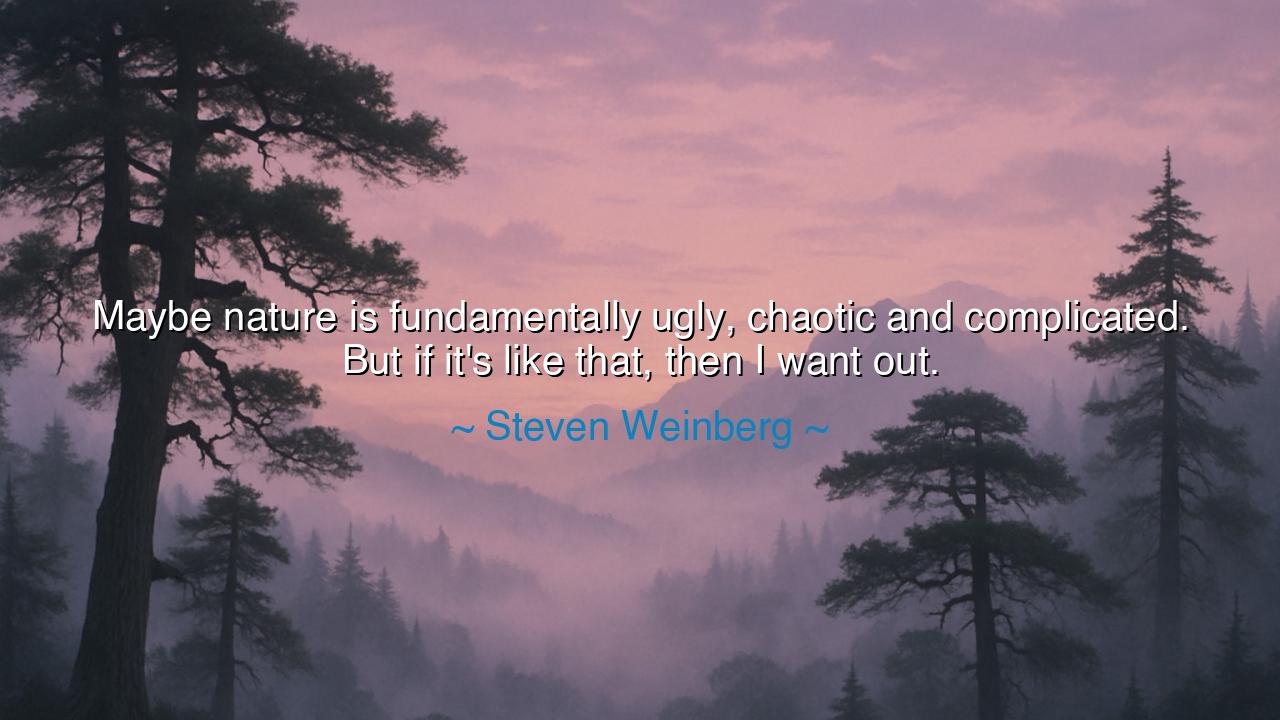
Maybe nature is fundamentally ugly, chaotic and complicated. But
Maybe nature is fundamentally ugly, chaotic and complicated. But if it's like that, then I want out.






In the words of Steven Weinberg, "Maybe nature is fundamentally ugly, chaotic and complicated. But if it's like that, then I want out." Here lies the cry of a soul who longs for beauty and order in the vastness of the cosmos. To utter such words is not to reject the world in despair, but to reveal the depth of humanity’s yearning—that the universe, in its deepest essence, should shine with harmony, elegance, and truth. For what would it mean to live in a cosmos that is only a tangled knot of disorder, with no higher pattern for the heart to behold? Such a thought strikes at the root of our ancient hunger for meaning.
The origin of this cry is found in Weinberg’s lifelong journey as a physicist, who sought the hidden unity behind the forces of creation. In his quest to uncover the foundations of reality, he confronted a universe that often seemed indifferent, governed not by a single melody but by countless dissonant notes. When he speaks of ugliness and chaos, he reflects the tension between human longing and cosmic indifference. Yet in this very tension lies the greatness of the human spirit: for we alone, of all creatures, demand that the world make sense, and that its face be more than shadows.
The ancients, too, knew this longing. Pythagoras looked into the heavens and declared that the stars moved with the music of spheres, believing the cosmos itself to be a grand harmony. Plato taught that beyond the shifting appearances there must be perfect forms, eternal and unchanging. To them, to call nature beautiful was not mere poetry, but a necessity: for the soul could not rest in a universe without order. And so, Weinberg’s lament is the echo of this ancient tradition—an echo that asks: If nature be without beauty, what, then, sustains the heart of man?
Consider the story of Kepler, who labored through years of failure and disappointment, seeking a perfect pattern for the planets. At last, he discovered that their orbits were not circles but ellipses—less elegant, more complicated. Yet from this imperfection arose a greater truth, a law that brought him to tears of joy. He wrote, “I feel carried away and possessed by an unutterable rapture,” for in the hidden complexity he still found divine order. His journey shows us that even when nature appears complicated, the seeker may yet uncover a deeper simplicity—one that is not obvious at first glance.
Thus, Weinberg’s words should not drive us to despair, but to courage. If the world seems chaotic, let us not shrink back. Let us instead press forward, to uncover what beauty hides within the storm. For it may be that what we call chaos is only the mask of a higher order, awaiting the patience of our vision. The human heart must not demand that the universe bend itself to our desire for elegance; rather, it must learn to wrest meaning from the raw stone of reality, as the sculptor carves a figure from formless marble.
The lesson, then, is clear: do not flee from the ugliness and complication of life, nor from the seeming disorder of the world. Instead, see in them the challenge and the invitation. The universe does not hand us beauty freely; it asks us to labor for it, to perceive it where others see only confusion. In this way, we become not passive spectators, but co-creators with the cosmos, discovering and naming the hidden fire that burns in the dark.
In your own life, when you face hardship, chaos, or the messiness of existence, do not say, “I want out.” Say instead, “I will endure, and I will seek the pattern.” Take the complexity of your days and search for the thread of meaning. Practice patience in study, courage in adversity, and reverence in moments of awe. Seek beauty not only in what is simple, but in the layered and difficult. For just as the stars reveal their secrets only to those who watch long into the night, so too does life reveal its wisdom only to those who persist in hope.
Therefore, remember this: the world may at times appear ugly and without purpose, but within that seeming disorder lies the possibility of discovery, harmony, and even glory. The task of the human soul is not to escape but to remain steadfast, to wrestle with the universe until it yields its secret song. And in that struggle, you will find not only the face of nature, but the strength and beauty of your own spirit.






AAdministratorAdministrator
Welcome, honored guests. Please leave a comment, we will respond soon